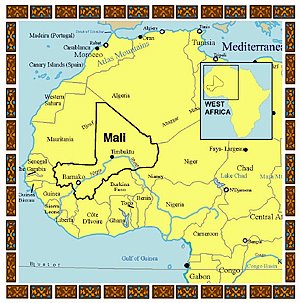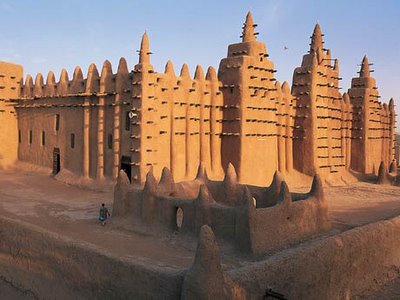Off to Mali
My time in the Gambia is coming to an end - which is sad - but it does mean that I can now do my long-planned holiday in Mali - which is good - and will finally be headed back to the UK - which is great! So I'll talk a bit about my planned trip to Mali, because that's what I've been researching the last few days.
Mali is described (in the Lonely Planet guide to West Africa) as the "jewel in the crown" of West African destinations. It is also seen as a very significant cultural homeland by the main tribal group (the Mandinkas) in Gambia, so lots of my Gambian colleagues are very excited that I am going to visit their "motherland"...

To start with a main map, which shows sizes, positiions and major cities. I live just outside Banjul (Gambian capital) and my route will basically be Banjul - Dakar - Bamako - Timbucku - Bamako - Banjul, over about 3 weeks, using road, river, train and one plane trip.
Timbucktu is on the Southern edge of the Sahara desert, and is a semi-mythical kind of place mainly because it was enormously difficult for Europeans to reach for several hundred years. I think when they finally got there, they were somewhat dissapointed: after years of expecting streets paved with gold, they found streets that were, well, not paved at all... We might get there too, depending on how the transport works out.

Another very famous landmark in Mali is the mud-built mosque in Djenne - the largest mud-built building in the world, and a very beautiful piece of religious architecture to boot!
Lots of other exciting things in Mali include the music scene in Bamako - thought to be one of the worlds great sources of musical innovation - , trekking in the mountainous Dogon country and travelling along the great river Niger. I should also have a few days in Dakar, the capital of Senegal, which has lots of interesting stuff about the history of the slave trade in West Africa. And both of these countries are theoretically Francophone, so I'll have to dust off my rather rusty French for the inevitable negotiations over the prices of absolutely everything...
So I'm pretty excited about going. My companions on the trip are a funny mixture of nationalities: American, Finnish and Japanese/Canadian, all of whom are working here in the Gambia at various different places. I've been designated "translator into French" and "first-aider" for the trip, and we also have a good musician and a Bamara (main local Malian language) speaker...
Finally flags
 Mali's flag
Mali's flag Senegal's flag
Senegal's flagAs you can see, there is a fair bit of similarity between the flags of the two countries! They are both using the "Pan-Africanist" colours - red, gold, green - which originates in Ethiopia and forms the basic colour-scheme for many ancient and modern African flags, as well as the rastafarian movement!
